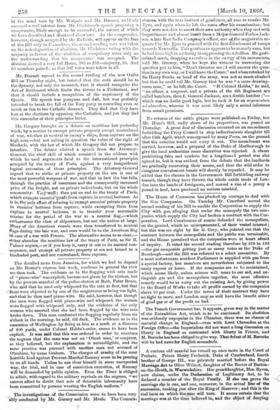The House of Commons has plucked up courage to deal
with the Gas Companies. On Tuesday Mr. Crawford moved the second reading of his Bill to enable the Corporation to supply the City with gas, alleging that under the monopoly the two com- panies which supply the City had broken a contract with the Cor- poration. Lord Cranbourne of coarse defended the monopolists, on the ground, which he misrepresented, of their vested interest ; but this was set right by Sir G. Grey, who pointed out that the contract between the monopolists and the public was terminable, and the House perceived that the companies were at heart afraid of inquiry. It voted the second reading therefore by 219 to 193 —the gas companies getting just as many votes as the Duke of Buccleugh—and the Bill was referred to a select committee. By a most unfortunate accident Parliament is supplied with gas from a special factory, but members are nevertheless subjected to the nasty vapour at home. If the companies are to be maintained, which seems likely, unless science will coma to our aid, and ex- tinguish gas and the monopolists together, the most effective remedy would be to carry out the existing Act, by giving power to the Board of Works to take all profits earned by the companies above 10 per cent. Under the terms of their contract they have no right to more, and London may as well have the benefit either of good gas or of the profit on bad.






























 Previous page
Previous page